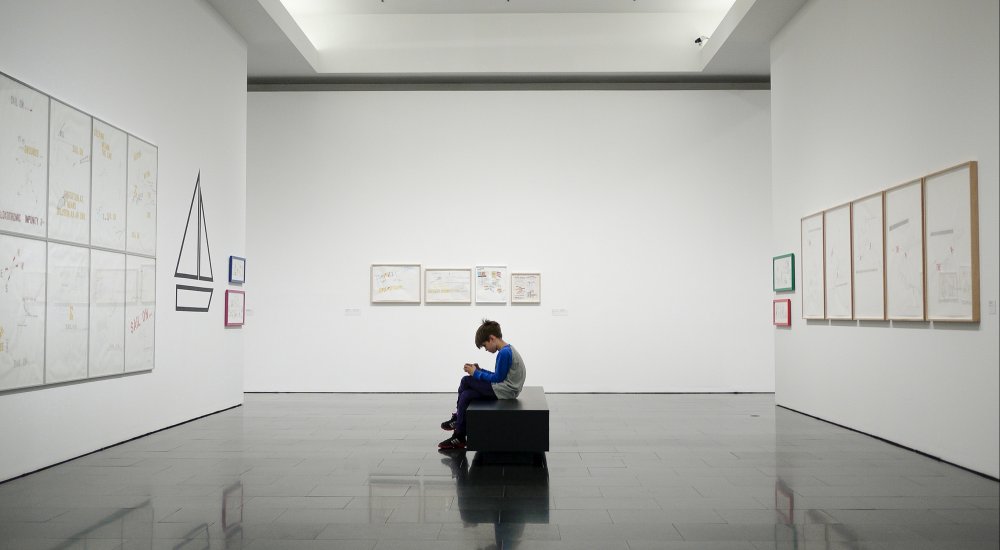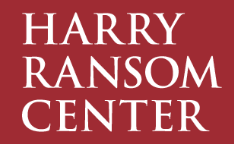Ransom Center Research Fellowships in the Humanities

The Ransom Center will award up to 60 research fellowships for its 2024–25 program. Please view the individual residency types within the application instructions to determine the qualifications for each. We offer funding to postdoctoral scholars, doctoral candidates, independent researchers, and scholars with master’s degrees who have had significant involvement in academic research.
Research conducted by humanities scholars contributes to a dynamic body of knowledge that has the potential to reshape our understanding of archival collections—what is preserved and valued in our communities. The Ransom Center fosters a supportive environment so that researchers may explore, examine, critique, and better understand the cultural works in its collections. Fellowships of varying lengths (from one to three months) are offered for research projects that require substantial on-site use of collections that span a variety of disciplines.
Ransom Center Fellowship Program & Guidelines
The Ransom Center's internationally renowned collections encourage and support research in all areas of the humanities including literature, photography, film, art, performing arts, music, cultural history, and interdisciplinary studies.
Research projects might include:
Fellowship Guidelines (updated March 2023)
- Scholarly articles or monographs
- Dissertations
- Creative work
- Digital humanities
- Performance-based research
- Exhibition proposals
- Research-based syllabi to grow student research
- Collaborative research
The Ransom Center is thrilled to be awarding up to 60 research fellowships for its 2024-2025 program, including 10 dissertation fellowships. The fellowship projects must require substantial on-site use of the Center's collections, which support exploration of all areas of the humanities, including literature, photography, film, art, the performing arts, music, and cultural history.
APPLICATION DEADLINE: NOVEMBER 1, 2023, NOON CST (UTC-6)
Types of Available Fellowships
One– to Three–Month Fellowships — $3,500 PER MONTH*
One– to three–month fellowships are available for postdoctoral or independent scholars whose projects require in-person engagement with the Center's holdings. Scholars with master’s degrees and a demonstrable record of exemplary research are also welcome to apply.
Travel Stipends — $2,000*
Travel stipends are available for postdoctoral scholars, independent researchers, and graduates with master’s degrees whose projects require less than one month's use of the Center's collections. Travel stipends may not be combined with other Ransom Center fellowships.
Dissertation Fellowships — $2,000*
Dissertation fellowships are available for graduate students whose in-progress doctoral dissertations require use of the Center's collections.
* For all fellowship categories, an additional, one-time $500 stipend will be provided to individuals who are a citizen or resident of a country other than the U.S. to contribute to the costs associated with the J-1 visa and/or international travel to Austin.
The Center gratefully acknowledges the endowments and annual sponsors that support these fellowships.
Statement on Diversity
As the Ransom Center examines its evolution across three pivotal collecting timelines (1883–1957, 1957–1978, and 1978–present) in accordance with its Diversity and Inclusion Action Plan, we are mindful that museum and archival holdings such as ours were founded on Eurocentric practices. Our Center regularly reconsiders the tenets of our Diversity and Inclusion guidelines. We encourage people of all identities to apply as we hold space for scholarship from researchers who have been historically excluded, misrepresented, or silenced, particularly those who are Black, Indigenous, and People of Color.
Applicant Experience
One– to three–month fellowships and travel stipends are open to individuals with either a Ph.D. or a master’s degree and a demonstrable record of exemplary research. If the Ph.D. is in progress at the time of application, the proposal and letters of recommendation should clearly indicate completion by June 1, 2024. Otherwise, the applicant should consider applying for a dissertation fellowship.
Dissertation fellowships are open to doctoral candidates whose dissertations are in progress by the time of application and have not been completed by the start of the fellowship period.
Previous recipients of Ransom Center fellowships are eligible to reapply with new projects after two full fellowship cycles have passed.
Collection-Centered Applications
When considering your research proposal, please take a look at our ever-developing research guides, which provide interpretive information related to context as well as insight into the strengths and limitations of what we carry for each discipline. The Ransom Center is especially interested in proposals from candidates who can contribute to our charge for diversity as we strive to grow a vitally inclusive research culture. We support work in both traditional formats (such as peer-reviewed articles or non-fiction manuscripts) as well as creative works (novels, films, etc.), and particularly welcome scholars who think critically about archival representation to recognize where there are gaps or inequities in scholarship.
Applicants may contact the Ransom Center at reference@hrc.utexas.edu with specific inquiries about the collections and to confirm that the materials they wish to consult will be available during their proposed visit. Inquiries about the collections should be submitted by October 1st, 2023 with the subject “Fellowship Applicant – [applicant name]” to guarantee a response before the application deadline. Other information about the Center's collections, including our Material Use Policy may be found online.
Questions about the fellowship program or application instructions should be directed to ransomfellowships@utexas.edu.
Application Procedures
A complete application consists of a three-page proposal and one or two letters of recommendation as outlined below. These materials must be uploaded to the Ransom Center's online application system as PDF files by the application deadline. To begin your application for a 2024–2025 fellowship, create a fellowship account. Upon successful creation of your account, you will receive a fellowship account number, which you must use to submit your proposal, and which your reference(s) must use to submit the required letter(s) of recommendation. Please note that information cannot be revised once submitted. Previous applicants for Ransom Center fellowships must create a new account for 2024–2025, as accounts from previous years cannot be reused. We apologize for any inconvenience this causes our applicants.
Proposal
Create your three-page proposal as outlined below. We ask that the proposal be in English and submitted as a single PDF file through the Ransom Center's online application system using your fellowship account number. Files longer than three pages will not be accepted.
Required: Each page should include your last name in the top-right corner and be formatted with one-inch margins and a sans-serif or serif font size of 11 pt. When submitting a PDF of your three-page proposal, you will be asked to provide—via an online application form—a brief summary of your proposal in 100 words or less. The 100-word abstract should not be replicated within your three-page PDF.
Page One
The first page of your proposal should provide your name and project title, followed by a summary of the proposed research project. Keep in mind that research topics and their significance should be thoroughly explained and placed in the context of the larger field of study. Please also describe the anticipated result of the project (journal article, book, edited volume, or other format).
Page Two
The second page of your proposal should provide a detailed account of your anticipated use of the Ransom Center's collections. Describe the materials you will consult, their relevance to the project, and why these materials must be consulted on-site during the length of fellowship requested. In general, proposals must clearly convey the feasibility of a project, identify the required collections with detailed specificity (see next paragraph), and explain how the collections inform the larger project.
Using our finding aids, please include the specific containers, boxes and folders from the collections you plan to consult. If your selected materials are also represented in the Ransom Center's digital collections, be sure to explain why on-site review is necessary for your project.
Page Three
The third page of your proposal should consist of an abbreviated curriculum vitae emphasizing relevant work, including publications. Previous recipients of Ransom Center fellowships should include results of fellowship-supported research.
Letters of Recommendation
Applications for one- to three-month fellowships and travel stipends must include two confidential letters of recommendation from individuals who are qualified to judge the proposal. Applications for dissertation fellowships must include only one letter of recommendation, which should come from the dissertation director or an appropriate member of the dissertation committee. Letters of recommendation must be in English and bear the referee's signature. Letters must be submitted as a PDF through the Center's online application system by the referee using the applicant's fellowship account number. The deadline for the application materials (below) applies also to the letters of recommendation.
Application Deadline
The proposal and required letter(s) of recommendation for 2024–2025 fellowship applications must be submitted through the Center's online application system by November 1, 2023, noon, CST. An automated email will be sent to the applicant upon the successful submission of each item. Applicants are responsible for ensuring their referees meet the deadline and that all required materials have been submitted. Materials cannot be accepted after the deadline has passed.
Announcement of Decisions
Decisions will be announced by email on April 1, 2023. Queries about applications in-process cannot, unfortunately, be acknowledged. Fellowship recipients and their research projects will be recognized in Ransom Center publicity.
Stipends
Fellowship stipends are awarded according to the category of award and the fellowship recipient's need to travel to the Center. An additional, one-time $500 stipend will be provided to individuals who are citizens or residents of countries other than the U.S. to contribute to the costs associated with the J-1 visa and/or international travel to Austin. For all award categories, stipends will be issued after the Fellow arrives at the Ransom Center for their residency.
Residency
Recipients of 2024–2025 fellowships must complete their residencies between June 1, 2024, and August 31, 2025, though we can be somewhat flexible about the start date if all the administrative documentation has been submitted before the outset of the residency period. Complete information about the fellowship residency may be found in the fellowship guidelines.
Contact
Danica Obradovic
Fellowship Coordinator
ransomfellowships@utexas.edu

